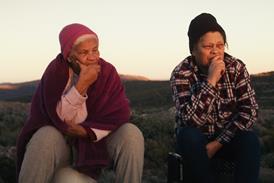Dir/scr: Camila Guzman Urzua. Fr-Sp. 2006. 80mins.
A classic portrait of a dream gone wrong, Camila Guzman Urzua's personaland intimate Cuba documentary The SugarCurtain is as fierce an indictment of the Castro regime as any academicanalysis of it.
The daughter of expatriateChilean film-maker Patricio Guzman, whosedocumentaries on Pinochet's military coup are textbookmaterial for political studies, Guzman Urzua grew upfrom the age of two in Havana. In her youth, as she explains, she thought of itas a sort of paradise, as seen through the warmly sympathetic picture shepresents of the 1970s and 1980s. That she doesn't think so any more becomesevident when she highlights the bitter disappointment that all the lofty idealsultimately delivered.
While it never attempts to includecomment from any politicians or the like, focusing instead on childhood friendsas they grow up together, The SugarCurtain is all the more effective for its lack of flag waving and ideologicalexposition. Festivals, always interested in political angles, should give it aserious look, as should appropriate TV outlets.
Guzman Urzua'seagerly expected debut picture, parts of which were introduced at last year's EnConstruccion section at San Sebastian, states itsambiguity from the start. Guzman Urzua 's camerashows schoolchildren dutifully reciting a tribute to a national hero, employingthe kind of empty indoctrinated phraseology used by all dictatorial systems tocement their popular roots. Is this intended as political satire, the audienceasks itself, or simply an innocent rendition of what happened'
The answer is delayed while GuzmanUrzua launches into an elegy to the Cuba she onceknew and loved, a place that knew 'no rush, noanxiety, no fears and no violence'. While later showing the militarytraining in school, she recalls that despite all the threats they heard of apossible attack and the need to defend their fatherland, she and her friends werenever worried ('we were all Pioneers, had a peaceful lifestyle and felt wewere forging the future of our country').
Equality reigned supreme, GuzmanUrzua explains: no one cared about money, there was ageneral sense of solidarity and equal opportunities ensured everyone could goso far as their talent could carry them. Faith in a new society was widespread.'I remember being very happy' says Guzman Urzuain her voice-over narration, with most of the friends she interviews joiningin.
The first cracks in thedream came with the advent of perestroika and the fall of the Berlin wall. Afterthe Special Period (1991-4) as it was known and the complete collapse of Cubaneconomy, nothing was the same again, as materialism stopped being an abstractphilosophical idea and became instead a reality. The shortage of everything,including elementary goods, changed the attitude to money and property.
Instead of socialism orcommunism, Cuba all of a sudden basked in what one of the interviewees calls'the new capitalism'. Money counted, as taxation introduces apreviously unknown concept of the state sharing one's gains. Meanwhile thelegalisation of the dollar created two separate markets: one for foreigncurrency and the other for the Cuban peso.
The human cost is that uncomfortabletruths are suddenly revealed, like the very long list of Cubans who died aroundthe world, volunteered by their government to fight for the victory of the socialistrevolution, wherever it may be. The lottery for American Green Cards meanwhile becomesa life saver, as nobody can get by at home without help from abroad.
During this time, Guzman Urzua herself was already studying in Europe; most of thesefacts emerge through conversations with her former friends and colleagues - or thefew who still living in Cuba, for many of Guzman Urzua'schildhood friends, as the film reveals by its end, are living anywhere else buttheir place of birth.
Relying mostly on informalinterviews which are presented as a collection of simple truths put forward bypeople who feel at home with her, Guzman Urzua, delivers a sincere and unpretentious account of modern Cuba.Shot digitally with Guzman Urzua herself holding thecamera and adding to the intimacy of the proceedings, and intelligently cut, itmaintains an emotional and very personal touch throughout but does leave onecrucial question.
Was Guzman Urzua right to dream of a perfect world - or was it justchildhood innocence and ignorance that made Guzman Urzuaherself and all her friends believe in'paradise' only because they were ignorant of its shadows' The answeris self-evident, and explains, in its way, the downfall of the Marxist utopia,not only in Cuba, but everywhere else as well.
Production companies/backers
Luz Films
Paraiso Production Diffusion
International sales
Transit Films International/Wide Management
Executive producer
Nathalie Trafford
Producer
Camilla Guzman Urzua
Cinematography
Camila Guzman Urzua
Editor
Claudio Martinez
Camila Guzman Urzua
Music
Omar Sosa



















No comments yet